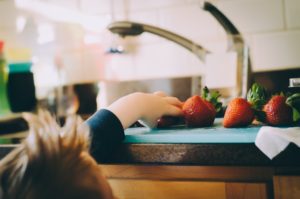Mealtimes Matter – Tips From an Occupational Therapist for Fine and Gross Motor Skills
At Cooee Speech Pathology, our team of Occupational Therapists on the northside of Brisbane work with children and their families to develop the skills needed for functional tasks such as using cutlery during mealtimes.

Why are mealtimes important?
Mealtimes are a very important time of day, for people of all ages and for lots of different reasons. Sharing meals together as a family is an opportunity to come together, share experiences from throughout the day and connect with each other. This is a great time to work on social emotional interaction skills with each other while taking in delicious and nutritious food. For some little ones, however, mealtimes can be very challenging if they do not have adequate fine and gross motor skills to learn how to independently feed themselves.
What skills are required?
Some of the motor skills a child uses for feeding are:
- Pincer grasp – used for finger feeding.
- Adequate postural control and core strength – children need this to be able to sit upright at the table without needing to lean over or prop themselves up. If children do not have adequate postural stability, you may find that they often spill their food by having to lean over or backwards on their chairs.
- Integrated visual motor skills – this includes visual perceptual skills and hand eye coordination. This is needed to use tools to manipulate the food and bring it to the mouth. Visual perceptual skills can also aid in recognising how much pressure to apply through the cutlery and onto the food.
- Bilateral coordination – to be able to use a knife and fork at the same time.
- In hand manipulation – for use of cutlery and finger feeding.
It is important to note that motor skills are only one aspect of what children need for independent feeding. Attentional skills play a very important role in supporting children to learn how to independently complete functional tasks, such as using cutlery and feeding. Some of these skills include concentration, inhibiting impulse actions, ability to follow directions, self-monitoring and problem-solving. You can learn more about executive function skills here.
What can I do at home to support the development of fine and gross motor skills needed for feeding?
The following activities are suggested for little ones at home to develop their skills that can be used for feeding and learning how to use cutlery:
- Threading small beads, focusing on the use of pincer grasp and bimanual coordination
- Place small beads or cotton balls into a muffin tray – use pointer finger and thumb (pincer grasp) to pick up the small objects.
- Practice cutlery skills with playdough or Theraputty – you can roll the putty into a long ‘sausage’ shape then use your knife and fork to practice applying pressure to the putty while practicing the cutting motion with your knife.
- Practice scooping with a spoon by using beans, rice, sand, toys and counters.
- Make a painting by using a knife to spread the paint.
- Hold a pretend tea party.
- Use a visual such as a sticker, rubber band or playdough to indicate where the child should place their finger on the utensil.
- Use tongs or training chopsticks to pick up objects such as small pompoms – make it a game by seeing how many you can get in 1 minute!
- Using pushing and pulling activities such as tug of war, wall pushes or baking (mixing cookie/muffin mixtures or kneading dough) to support development of knife skills.
Children may experience difficulties with developing the skills needed to independently feed themselves – whether it be due to fine and gross motor skills or concerns relating to their executive functioning/attention, sensory processing or cognitive development.
If you have any concerns relating to your child’s development of skills needed for functional or self-care activities such as feeding and using cutlery, then please do not hesitate to contact our lovely client care team on 3265 4495 or chat to one of our occupational therapists.

Georgia O’Connor
Occupational Therapist
